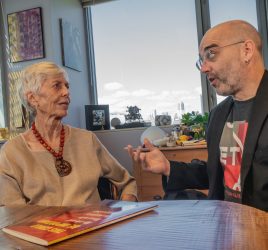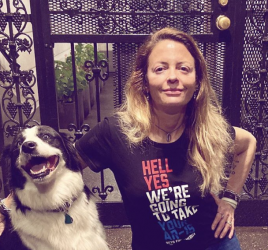What Your Teacher Learned from David Foster Wallace
Hello Students:
You have all heard me discuss David Foster Wallace numerous times throughout the semester (including the class-opening essay, which I still encourage you to read). This will likely not stop during the last 8 weeks. I’d apologize, but since I’m not going to stop, it seems disingenuous to do so.
However, of all the writing he’s done, the one that may most directly impact you comes from a commencement speech he gave at Kenyon College. A speech that was later turned into a short book. One that was adapted in the Wall Street Journal. (You can download it here.)
I tell you this for a few reason, which I hope you’ll allow me to articulate before you scattered off this weekend.
My responsibility as your teacher is a serious one, although likely not in the way that you think. Or have been led to think.
What you are learning today is simply a set of building blocks that you will soon forget as you continue to grow and expand the skills that will guide you through the world. This is part of the learning process. You acquire new skills, assimilate them, and move forward. Wash. Rinse. Repeat.
In ten years, it’s likely you won’t remember my name. What class we had together. What building blocks I helped you find.
This is the nature of the job.
There is something more subtle, more important, that good teachers do. One that if we do correctly, will stay with you. Although you won’t even know it. And it’s more important than any skill, or test, or quiz or bit of knowledge we help you learn, pass or remember (although that doesn’t get you out of learning, passing and remembering).
The most important thing we do is help you understand yourself and your place in the very big, very wide, very unforgiving world around you. To teach you to understand why you have the thoughts you do, where they came from, why they ended up being “this” thought instead of that “that” thought and how you can find you way to some meaningful interaction with the numerous people who have “that” thought.
Wallace is a writer who does that.
Unfortunately, his skill is not A skill is not one I can’t teach you. Because it’s something far more than simply writing, or reasoning or storytelling (although it’s certainly a combination of all three). It’s exactly that “most important” skill I just described.
What makes his writing different is his ability to distill his life and the world around him into these nuggets (although sometimes the nuggets are 1,000 pages) of humanity. And you can only do that if you have a strong sense of who you are (which is not the same as being confident, by the way) and who everyone else is.
It’s hard work to do that, by the way. Exhausting at times. Frustrating too. Maddening.
But, and I ask you to simply trust me on this matter, it’s the most rewarding, the most important and the most fulfilling thing you will ever spend your time doing.
As we barrel into the mid-point of our semester, some classes doing well while other classes struggle, I thought it important to relay this little bit of wandering wisdom:
You never know what skill, what tool, what bit of knowledge will help you unlock the puzzles of your life and the world around you. I can promise you, though, that what you know to be true today will likely not be so tomorrow. Andif you discard the skills being taught today because you can’t find an immediate purpose for them, you might miss out.
On the most important thing.



